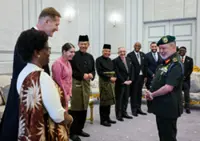
FILE PHOTO: Director of the Federal Police's International Cooperation department and Interpol Vice-President for the Americas, Valdecy Urquiza, speaks during an interview with Reuters in Brasilia, Brazil February 2, 2024. REUTERS/Adriano Machado/File Photo
BRASILIA (Reuters) -Interpol's executive committee on Tuesday for the first time elected a police official from a developing nation to head the international police agency, Valdecy Urquiza from Brazil.
Urquiza, 43, who is currently Interpol's vice president for the Americas and head of international cooperation at the Brazilian federal police, will succeed Juergen Stock of Germany to lead Interpol from 2025 to 2030.
Urquiza, a graduate of the FBI National Academy in Quantico, Virginia, received eight votes against two for Britain's candidate Stephen Kavanagh and one for Mubita Nawa from Zambia.
His election must be ratified by Interpol's general assembly in November in Glasgow, the Brazilian government said in a statement. The assembly has always followed the committee's recommendations for secretary-general.
"This is recognition of Brazil's neutrality," Urquiza told reporters after his election at the agency's headquarters in Lyon, France. "Interpol has much to gain from diversity and the experience of other countries," he said.
Urquiza plans to strengthen Interpol as "an absolutely necessary platform for police work in the world" and avoid the agency being used for political ends, he told Reuters by phone.
Russia escaped suspension from Interpol after invading Ukraine in 2022 when critics accused Moscow of abusing the agency's tools, such as its "red notice" system, to get political opponents arrested abroad.
"Interpol has to remain a technical platform," Urquiza said, without naming any particular country.
Interpol is the world's largest police organization with 196 member countries.
In its 100 years, Interpol has been run by men from just five developed Western countries, four in Europe and the U.S.
"The organization runs the risk of losing credibility and legitimacy if it isolates itself. What we need for Interpol's success is plurality. We need all countries to feel included, for all regions to be served," Urquiza told Reuters in an interview in February.
(Reporting by Anthony BoadleEditing by Bill Berkrot and David Gregorio)








































